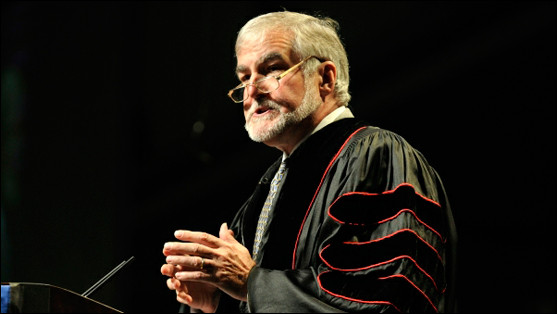
Sunday worship: Our covenant with all being
“I have never become reconciled to . . . dying,” Schulz said; “it continues to break my heart. But what the religious life has forced me to do is to look to the farthest reaches of those starry heavens and the murkiest depths of that moral law within and to ask myself what the connection there might be between the two.”
Midway through his sermon, he showed the congregation a video that takes the viewer soaring out away from the Earth until the entire cosmos can be seen, before zooming back down to the subatomic level. “You and I do not need to understand quasars or black holes or string theory or cosmic inflation to be stunned into silence by the majesty of Being itself,” Schulz said when the video had ended.
“We are each one of us held in the embrace of Creation,” he said. “But if that is true, then why do we feel so frightened? Why do we know exactly what that woman in the cartoon meant when she said, ‘I’m not religious; I’m just scared’?”
We are afraid, he acknowledged, because we are fragile and small and vulnerable, especially in the grand scheme of things. “Our fragility—as human beings, as a human race, and as a planet—that is the connection between those starry heavens above and Kant’s moral law within.”
The moral law compels us to stand with the vulnerable. And furthermore, he said, “because we are so fragile, so unlikely to be here in the first place, such a surprising twist of Creation, our wisest sentiment is gratitude and our smartest strategy is trust.”
Music for the service was provided by the General Assembly choir, conducted by Dallas Bergen, accompanied by a string quartet and other musicians from the Unitarian Universalist Musicians Network.
Photograph above: The Rev. Dr. William F. Schulz preached the Sunday morning sermon at the 2013 General Assembly. (© Nancy Pierce/UUA)







